
Synopsis
15-year-old Flea has just watched his father help lead the Scottish army to triumph in the war against Norway, and now father and son, and his father’s best friend, are on the road back to the camp, when they meet – three witches…
And so we see the familiar story through the eyes of Banquo’s son Fleance, who overhears Macbeth and Lady Macbeth planning to kill the King, and then sees two strangers kill his father and try to kill Flea himself. Wounded, he escapes into the woods. From there, he and his new friend Hamish, the drunken porter, join in an uneasy alliance with the beautiful Witch Elspeth, who has plans of her own for young Flea. A sword-and-sorcery spinoff of Macbeth, featuring ghosts, apparitions, witches both good and evil, betrayal, murder, and young love.
Production History
Old Enough to Kill was produced by Gnu Ground Theatre, Kingston, Ontario, in 2011.
Requirements
16 characters, plus soldiers; with doubling and tripling, the play can be produced with as few as eight actors. Multiple settings, similar to those in Shakespeare’s Macbeth. A full-length play in two acts. Requires sword-fighting skills on the part of some of the actors.
Excerpt
The night before this scene, MACBETH sent two Murderers, accompanied by his drunken porter HAMISH, to kill BANQUO and FLEA. They killed BANQUO, but HAMISH managed to save FLEA, who escaped with a wounded arm, leaving his father’s sword behind. Now we are in the forest, in the grey dawn. FLEA sleeps, holding the empty scabbard to BANQUO’s sword, a tourniquet on his wounded arm.
(A figure approaches. It is HAMISH, carrying the bare sword. FLEA suddenly awakens and jumps to his feet, FLEA armed with the scabbard and HAMISH with the sword. Though in pain, FLEA backs HAMISH up, slashing at him.)
FLEA: You killed my father!
HAMISH: I never! ‘Twas them others!
FLEA: An’ you tried to kill me!
HAMISH: I saved your life, laddie! I didn’t know what they were going to do! Macbeth sent me to spy on ‘em an’ see if they went through with the job. But I didn’t even know what the job was, ‘til they took out their swords!
FLEA: Why did he send you to spy on them?
HAMISH: He didn’t trust ‘em.
FLEA: Why didn’t he tell you what they were going to do?
HAMISH: Didn’t trust me neither.
FLEA: Well, then, he was right.
HAMISH: Aye. Because then I put out the torch so you could get away. Don’t you remember? I saved you! The fellow struck me down for it! Please don’t kill me!
FLEA: That’s my father’s sword!
HAMISH: Aye! Here! Take it an’ kindly don’t kill me! (Gives FLEA the sword, which makes FLEA pause.) I’m Macbeth’s porter, Hamish, remember? Only I’ve run off. I won’t work for them people no more. Would you please put that down, lad? For one thing, you’re in pain.
FLEA: Not yet. (Brief standoff.)
HAMISH: Well. I suppose ‘tis an honour of a sort. To be threatened by great Banquo’s sword. Which I helped forge.
FLEA: You forged my father’s sword?
HAMISH: Helped. Tended the fire, hauled the water, pumped the bellows.
FLEA: It was finished the day I was born.
HAMISH: I know. He had two rules about his sword. He would never draw it in anger –
FLEA: An’ never draw it on an unarmed opponent.
HAMISH: Aye.
FLEA (brief pause): Sorry. (Sheathes the sword.)
HAMISH: Nay, you thought it was self-defense. Anyhow, ‘twas the scabbard you drew, so I think you’re innocent on that charge. (Takes out his flask, tries to drink; it’s empty.) Ah, ‘sblood. (Somewhere hereabouts, they sit.)
FLEA: So I guess you knew my mother?
HAMISH: Lady Banquo? Of course. Do you remember her?
FLEA: She died when I was three. I have but one memory. I was sitting in her lap, by the fireside, of an evening. She had a golden bracelet that she was turning on her fingers, so that it sparkled in the firelight.
HAMISH: A bonny memory. A bonny lass was your mam, too, if you’ll not mind my sayin’ it.
FLEA: Aye, that’s what my father always says. Said.
HAMISH: And a great lady. She and your father always treated me as an equal. That’s a sign of a great thane. Respect for the underlings. May I suggest you remember that, young master, now that you’re the new Thane of Loch-Aber.
FLEA (fighting back tears): Sorry. Men should not weep.
HAMISH: Nonsense. The good Caithness Witches say that tears are but rain to calm the storm inside you, so your heart don’t get blown out by the root. I know. Lost me wife some years ago. She died in a fire.
FLEA: Oh. That’s horrible. Did you weep?
HAMISH: Nay. Drank. How’s the arm?
FLEA: ‘Tis not a deep wound. I have tied it off. It will heal.
HAMISH: Brave lad.
FLEA: I am not a brave lad! I should not have run away. I should have stayed and fought.
HAMISH: That were insubordination, Sir! Your Captain gave you a direct order! Gave it three or four times, as I recall. “Fly, good Fleance, fly, fly, fly.” He even gave you a reason, which a captain need not do: “Take revenge.” There’s no shame in obeying an order to retreat.
FLEA: All right.
HAMISH: All right. Now I saw some rabbits in the tall grass yonder. D’you think your wounded arm and the mighty sword of Banquo can hunt us down some breakfast while I build a fire?
FLEA: Aye, we can do that. And then let’s find our way to Macduff’s castle.
HAMISH: Right. You and I, young master, we’ll make a good team, eh? D’you happen to know whether Captain Macduff is a lover of the whiskey? (They exit.)
*****